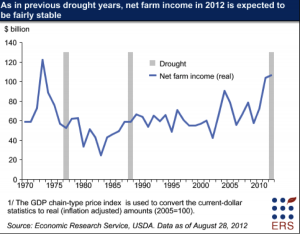Farmer Income and 2012 Drought: The Real Story?
By Taylor Reid
Obviously 2012 has been a tough year for many farmers. A severe drought has plagued much of the country, and it is certainly affecting yields. But what is it doing to farmer income? A recent New York Times story tells a terrible tale of woe for many farmers. According to the Times, farmers “…have canceled vacations. Their children are forgoing out-of-state colleges for cheaper ones close to home. They are delaying doctor’s visits, selling off land handed down through generations and resisting luxuries like new smartphones.”
Farming has failed to provide a lucrative income for all but the largest operators for decades now. So this story is not new. But is the drought really hurting farmers in the “grain belt” where it has been most severe? According to the the latest report from the USDA Economic Research Service (ERS), maybe not. ERS is actually predicting a farm income increase this year to $122 billion, up almost 4% over 2011 totals. In addition, the report predicts that farm equity will increase to “an all-time high of almost $2.3 trillion”. Why?
The  answer, according to an article on AgHub, is that record high prices and crop insurance indemnity payments will offset yield losses for many. Surprisingly, this is not uncommon during drought years, as the ERS chart presented here makes clear.
answer, according to an article on AgHub, is that record high prices and crop insurance indemnity payments will offset yield losses for many. Surprisingly, this is not uncommon during drought years, as the ERS chart presented here makes clear.
But this doesn’t mean that all farmers are cleaning up. Livestock and dairy farmers are expected to take a big hit from increasing crop prices.
Small-scale diversified farmers (of which beginning farmers make up a disproportionately large part) are not typically eligible for insurance program payments, and many are certainly suffering. Obviously, you can’t sell produce that you don’t have. And price increases in direct markets and small wholesale outlets can only go so high before consumers start to balk.
While these farms are more likely to have irrigation systems, watering is seldom a totally effective substitute for rain. It can also be costly, and many farmers have to worry about the capacity of their wells. In addition, their diversity often includes animals, and feed price increases are certain to hit the bottom line soon, if they haven’t already.
Many of the small farmers I’ve spoken with are suffering from the lack of rain in a way that the USDA outlook for large crop farmers doesn’t really measure.
Although the Farm Bill passed by the Senate and the House Ag. Committee includes new crop insurance options for small and diversified farmers, that doesn’t help anyone this year. The fact that the Farm Bill has now expired without a new one being passed (see https://www.beginningfarmers.org/the-farm-bill-has-expired-whats-next/ and https://www.beginningfarmers.org/congress-fails-farm-programs-farmers/) also adds to uncertainty for many of the nation’s farmers.
Despite the fact that a supplementary farm insurance package was passed this summer, conservation programs, beginning farmer programs, and many others remain in limbo. So while the the overall effect this year’s drought on farm incomes might not hurt large commodity crop farmers in the way the aforementioned New York Times article seems to suggest, political failures might actually provide a more significant problem.
And for the increasing number of small-scale beginning farmers who are providing a growing share of fresh food for local markets, there is no relief in sight.
Please share your own experiences and opinions on this issue by clicking the comment tab in the upper left hand corner of this post.



 Your Privacy Choices
Your Privacy Choices
You are so awesome! I do not believe I’ve truly read anything like that before.
So wonderful to find another person with unique thoughts
on this issue. Really.. many thanks for starting this up.
This web site is one thing that’s needed on the
web, someone with a little originality!